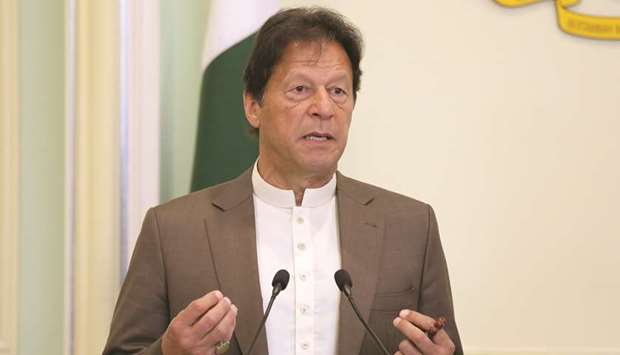Prime Minister Imran Khan said yesterday that Pakistan’s difficult days are now behind it and that the country is on the right track.
He made the remark yesterday while launching the Rs15bn “Ehsaas Amdan Programme” in Layyah, Punjab.
The Amdan (income) Programme is one of several programmes launched under the Pakistan Tehreek-e-Insaf (PTI) government’s Ehsaas initiative, a broad-based programme to lift the most vulnerable out of poverty.
The programme is aimed at creating respectable livelihood opportunities for those that are the most disadvantaged.
It involves giving away of small assets to those who live below the poverty line so that they can earn a living and lift themselves out of poverty.
Assets include livestock (goats, cows, buffaloes and poultry), agricultural inputs, Qingqi rickshaws, and inputs for small retail outlets and small enterprises.
In his address, Prime Minister Khan referred to the difficult economic conditions that continue to persist.
He explained that the government is constrained in providing relief because it had to return interest and payments due on past loans, or risk a default.
“If the country had defaulted, the price of everything would have doubled,” he said.
Expressing optimism, the prime minister said that the country now seemed to be on the right track and noted that the rupee was not devaluing any further.
Khan said that the current account deficit has reduced and the stock market is performing better, adding that in the near future the nation will get more “good news”.
“For women, we have decided that we will give them one cow, one buffalo, and three goats so that they can run their household [with their produce],” the premier said.
Khan further said that every month, the government will give out interest-free loans to around 80,000 people.
Commenting on other measures to help the most vulnerable, he said: “The government has made 180 shelters so far, and continues to build more of them.”
The prime minister said that under the programme, the poor will be given funds to hire a lawyer for their cases.
“Six million people will be given health cards,” he said.
Speaking on the education system, Khan said that efforts are underway to implement a single-curriculum across the country’s institutions.
He lamented that whatever has happened in the country so far, led to the rich becoming richer while the poor continued to decline financially.
While lauding Punjab Inspector-General of Police (IGP) Shoaib Dastgir, the prime minister said that he has directed the top cop to arrest the big fish first.
“Nations get destroyed when the influential people go to London and the smaller criminals are caught,” he said.
At the beginning of the ceremony, the prime minister formally inaugurated the programme by handing over various assets to beneficiaries.
Earlier, Dr Sania Nishter, the main architect of the Ehsaas programme, shared the details of the project, which will commence in 375 rural union councils in 23 of the poorest districts across the four provinces.
The programme has set a target of providing around 200,000 assets to deserving households (60% to women and 30% to youth beneficiaries).
The scale of the programme will be gradually enhanced based on results.
This programme complements Ehsaas Kafaalat, operations of which commenced on January 31, and through which the government will provide cash stipends of Rs2,000 to around 7mn most deserving women by end of the year.
Beneficiaries of both the Kafaalat Programme and the Ehsaas Amdan Programme have been shortlisted through a survey using the Poverty Score Card, so that only the most deserving will benefit.
The Pakistan Poverty Alleviation Fund (PPAF), an organisation attached to the Poverty Alleviation and Social Safety Division, is the lead implementing agency for the Ehsaas Amdan Programme, and is working through partner organisations that have a strong presence in the selected districts.
Community procurement processes have been established by the PPAF to ensure transparency and accountability in the identification, selection and procurement of all assets and/or vocational skills training.
Those beneficiaries that require vocational training are supported to attend courses offered by certified technical training institutes.
Training on asset utilisation and business planning are also provided to eligible household members to help them turn the asset into an economically productive enterprise.
Asset recipient households are also supported to access the Ehsaas interest-free loan window if it is available in their area, and if they believe they require additional financing for business enhancement.
In Khyber Pakhtunkhwa, there are 10 districts (Upper Kohistan, Lower Kohistan, Palas Kolai, Torghar, Batagram, Shangla, North Waziristan, South Waziristan, Dera Ismail Khan, and Tank) which will benefit as part of the initial launch.
In Baluchistan there are three districts: Jhal Magsi, Zhob, and Sherani.
In Sindh, the districts are Badin, Thatta, Sujawal, Kashmore, Shikarpur, Tharparkar, and Umerkot.
These districts were selected based on a special study which was conducted by the PPAF in which three parameters were taken into consideration: level of human development, level of poverty, and level of food insecurity.

Prime Minister Khan: If the country had defaulted, the price of everything would have doubled.
